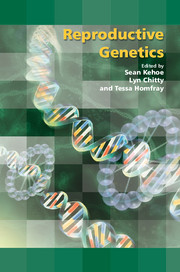Book contents
- Frontmatter
- Contents
- Participants
- Declarations of personal interest
- Preface
- 1 Genetic aetiology of infertility
- 2 Disorders of sex development
- 3 Preimplantation genetic diagnosis: current practice and future possibilities
- 4 Ethical aspects of saviour siblings: procreative reasons and the treatment of children
- 5 Epigenetics, assisted reproductive technologies and growth restriction
- 6 Fetal stem cell therapy
- 7 Prenatal gene therapy
- 8 Ethical aspects of stem cell therapy and gene therapy
- 9 Fetal dysmorphology: the role of the geneticist in the fetal medicine unit in targeting diagnostic tests
- 10 Fetal karyotyping: what should we be offering and how?
- 11 Non-invasive prenatal diagnosis: the future of prenatal genetic diagnosis?
- 12 Non-invasive prenatal diagnosis for fetal blood group status
- 13 Selective termination of pregnancy and preimplantation genetic diagnosis: some ethical issues in the interpretation of the legal criteria
- 14 Implementation and auditing of new genetics and tests: translating genetic tests into practice in the NHS
- 15 New advances in prenatal genetic testing: the parent perspective
- 16 Informed consent: what should we be doing?
- 17 Consensus views arising from the 57th Study Group: Reproductive Genetics
- Index
15 - New advances in prenatal genetic testing: the parent perspective
Published online by Cambridge University Press: 05 February 2014
- Frontmatter
- Contents
- Participants
- Declarations of personal interest
- Preface
- 1 Genetic aetiology of infertility
- 2 Disorders of sex development
- 3 Preimplantation genetic diagnosis: current practice and future possibilities
- 4 Ethical aspects of saviour siblings: procreative reasons and the treatment of children
- 5 Epigenetics, assisted reproductive technologies and growth restriction
- 6 Fetal stem cell therapy
- 7 Prenatal gene therapy
- 8 Ethical aspects of stem cell therapy and gene therapy
- 9 Fetal dysmorphology: the role of the geneticist in the fetal medicine unit in targeting diagnostic tests
- 10 Fetal karyotyping: what should we be offering and how?
- 11 Non-invasive prenatal diagnosis: the future of prenatal genetic diagnosis?
- 12 Non-invasive prenatal diagnosis for fetal blood group status
- 13 Selective termination of pregnancy and preimplantation genetic diagnosis: some ethical issues in the interpretation of the legal criteria
- 14 Implementation and auditing of new genetics and tests: translating genetic tests into practice in the NHS
- 15 New advances in prenatal genetic testing: the parent perspective
- 16 Informed consent: what should we be doing?
- 17 Consensus views arising from the 57th Study Group: Reproductive Genetics
- Index
Summary
Introduction
Antenatal Results and Choices (ARC), which was established in 1988, is the only UK charity providing non-directive information and specialised support to parents before, during and after antenatal testing and when an abnormality is diagnosed in an unborn baby. Continuing support is offered for as long as required, whatever decision is made about the future of the pregnancy. ARC also runs a well-established training programme for healthcare professionals in communication skills, breaking bad news and supporting parent decision making, all in the context of antenatal testing
For more than 20 years, ARC's core support service has been its national helpline. We take calls from across the UK on all aspects of antenatal testing and its aftermath. This chapter will use ARC's extensive experience with expectant parents to explore the potential implications for them of new techniques in prenatal genetic testing, particularly advances in non-invasive prenatal diagnosis (NIPD).
Throughout the chapter I will refer to women and their partners as parents and the fetus as a baby, as this is how the vast majority of callers to ARC conceptualise themselves and their fetus from the earliest stages of the pregnancy.
ARC's contact with parents making decisions about invasive diagnostic tests
By far the most common call on the ARC helpline is from parents after a screening result or ultrasound finding, when they are deciding whether to have a diagnostic procedure, either chorionic villus sampling (CVS) or amniocentesis. Approximately half of all helpline contacts by phone or email are of this kind.
Keywords
- Type
- Chapter
- Information
- Reproductive Genetics , pp. 199 - 204Publisher: Cambridge University PressPrint publication year: 2009

